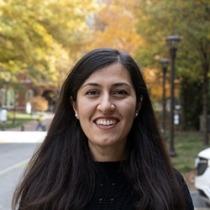
Arega Margousian
What is your next adventure?
just accepted a position as a propulsion testing engineer at the Busek Company in Natick, Massachusetts. They do research and development in electric propulsion and I will be on their micro propulsion team. I plan to work for a couple of years and then start a graduate program to continue learning.
What about your next adventure are you most looking forward to?
This job is very much aligned with what I want to do in graduate school - electric propulsion - and they know that that's what I plan to do.
Did you have any previous co-op, internship, or research experience in this area?
I have been working with Prof. Walker in the High Power Electric Propulsion Lab since 2017. There, I've learned to set up and run the vacuum testing facilities. With that sort of experience, I was able to get the internship in the Naval Research Lab, where I interned last summer, working as an electric propulsion engineer on hollow cathodes - a part of the Hall Effect Thrusters.
In the summer of 2018, I did an internship at Quartus in San Diego, doing structural analysis. I learned a lot.
How did your educational experience at Georgia Tech help you to achieve your goals?
The AE School helped me in a number of ways. First, there's the professors, who are very knowledgeable and great mentors. Then there are the classes where, you might not see it at the time, but the homework really prepares you for what you will face in the workplace. The problems I had to solve on my internships were like the problems I had already seen on homework, because the homework forces you to understand the concept, not just the answer that's in the book. Then there's the research experience. As a part of Dr. Walker's lab, I had access to all of the equipment and facilities that any research could want to solve problems. And Dr. Walker let us run the experiments, but he was always around if we had questions. I was mentally prepared to do research at the Naval Research Lab because it was so similar to what I'd experienced here. I was exposed to the equipment, the facilities, the challenge. And that's what makes Tech so different from other schools: if you do research here, you really learn how it's done.
Finally, I'd have to say the people I met at the High Power Electric Propulsion Lab were, intellectually, very smart, very focused individuals. I made great friends there, and learned from everyone. And it extended out of the lab, too. If I had questions about a class or about my career, those were the people I'd turn to.
What advice would you give to an underclassman who would like to follow the same path?
There are a number of things I'd say. First, take advantage of the faculty office hours, ask questions, before you make big decisions about your education or research plans. Second, I would say, form study groups. Even before that, you should make a point of talking to the person who is sitting next to you in class. Find out what they know, and help them with what you know. Outside of academic advice, I'd say: get outside your comfort zone. Try something new just to see what it's like. I participated in the Astronomy Club - not as much as I wanted to, because I wanted to do research, but I did go on a trip with them to Deer Lick Astronomy Village, which is a certified dark spot. Certified dark spots are where astronomists like to go to look at the stars. I also joined the Outdoor Recreation club because I am a hiker. But what I did with them was to go caving. It was quite an adventure, and I'm glad I did it because now I know that I don't really want to go caving again.
[Laughs.]
Looking back, I'd say the most important thing you can do is be honest with yourself -- and with your mentors -- regarding your skills, your interests, and your career. Don't keep it to yourself if you feel insecure. Ask, so that you can find a way. I was honest with myself about wanting to work in electric propulsion for space, but I didn't know how to make that happen, so I went to a lot of different people to ask them how to make it happen. The people I spoke to were smart, and they knew what I needed to do to get ahead. Not knowing was not the problem. Not asking would have been.
Honesty is always going to be important. I learned this again and again at Tech. For instance, once, I completely forgot to do the homework. Just didn't remember to do it. So I went directly to the professor and told him I didn't have any excuses or defenses. I had just not done the homework. I'm not saying that you should test this out by not doing your work, but the professor was so impressed with my honesty that he gave me an opportunity to make it up. Being truthful with yourself and with your professors is always going to be the right thing to do.